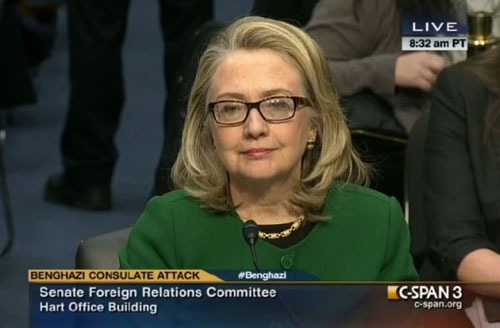by WorldTribune Staff, September 11, 2023
[Editor’s note: The following is a compilation of WorldTribune.com reports on events in the years after the September 11, 2012 terror attack in Benghazi, Libya. At 9:40 pm local time, members of Ansar al-Sharia attacked the American diplomatic compound in Benghazi. The terrorists killed U.S. Ambassador to Libya J. Christopher Stevens and U.S. Foreign Service Information Management Officer Sean Smith. At around 4:00 a.m. on September 12, the group launched a mortar attack against a CIA annex approximately one mile away, killing CIA contractors Tyrone S. Woods and Glen Doherty.]June 9, 2016: Hillary Clinton, in a June 8 interview with PBS, claimed no American lives were lost in the U.S. intervention in Libya and hinted that “pre-existing rivalries” were the primary cause of the chaos that followed.

“After due diligence, we came up with a way of supporting their efforts that did not cost a single American life,” Clinton claimed. “And we saved a lot of Libyan lives.”
The Democratic presidential candidate apparently forgot about U.S. Ambassador Chris Stevens, U.S. Foreign Service Information Management Officer Sean Smith, Tyrone S. Woods and Glen Doherty, who were all killed in the Sept. 11, 2012 Benghazi terrorist attack.
Clinton had initially blamed the Benghazi attack on an anti-Islamic YouTube video.
In the PBS interview, host Judy Woodruff asked Clinton: “We know that you, and you’ve talked about this, you encouraged the president to intervene in Libya in 2011. Recently President Obama said his worst mistake in office was probably failing to plan for the day after what he thought was the right thing to do in intervening there. How do you see your responsibility in that?”
Clinton replied: “Well, first of all, it’s important to remember where we were and why the president made the decision he did because this was a presidential decision.
“I have advised the president, sometimes he follows my advice, sometimes he doesn’t. Sometimes he uses a combination of what he hears from his advisers. We were looking at a potential disaster as Gadhafi threatened to massacre large numbers of his population. The Europeans, our Arab allies were urging us to help them to try to prevent that.”
Several media reports concluded that U.S intelligence did not concur with Clinton’s rationale for invading Libya and in fact “had come to the opposite conclusion: that [Gadhafi] would not risk world outrage by killing civilians en masse even as he tried to crush the rebellion in his country.”
September 16, 2016: The U.S. State Department waited over a year before producing emails stored on former Secretary of State Hillary Clinton’s private server despite 17 Freedom of Information Act (FOIA) requests.
According to documents obtained by Judicial Watch, “in August 2013, State Department officials were aware of 17 FOIA requests relating to requests for Clinton correspondence, including four that ‘specifically mention emails or email accounts.’
The lawsuit produced 276 pages of internal State Department records “revealing that within two days of the deadly terrorist attack on Benghazi, Mohamed Yusuf al-Magariaf, the president of Libya’s National Congress, asked to participate in a Clinton Global Initiative function and ‘meet President Clinton.’
August 4, 2017: In an April letter to Obama Administration national security adviser Susan Rice, current national security adviser H.R. McMaster said Rice would have continued access to classified information.
President Donald Trump was not aware of the letter or McMaster’s decision, two senior West Wing officials and an intelligence official told Circa on condition of anonymity.
WorldTribune.com columnist Sol Sanders wrote the following on April 16, 2017: “History tells us that Rice rattled off a false tale on several networks after the attack and death of four Americans – including the ambassador to Libya — in the Benghazi. Her detailed lie was that the deaths were the result of a semi-spontaneous anti-American demonstration occasioned by broadcasts from the then pro- Muslim Brotherhood broadcasts from radio Cairo that had spread throughout the Arab and Moslem world.”
October 21, 2019: Judicial Watch on Oct. 21 released new Clinton emails from 2012 on the Benghazi controversy that had been covered up for years and would have exposed Hillary Clinton’s email account if they had been released when the State Department first uncovered them in 2014.
“This email is a twofer – it shows Hillary Clinton misled the U.S. Senate on Benghazi and that the State Department wanted to hide the Benghazi connection to the Clinton email scheme,” said Judicial Watch President Tom Fitton. “Rather than defending her email misconduct, the Justice Department has more than enough evidence to reopen its investigations into Hillary Clinton.”
The long withheld email, dated Sept. 29, 2012, clearly responsive to Judicial Watch’s lawsuit seeking records concerning “talking points or updates on the Benghazi attack,” contains Clinton’s private email address and a conversation about the YouTube video that sparked the Benghazi talking points scandal. Judicial Watch’s Freedom of Information Act (FOIA) lawsuit in 2014 led directly to the disclosure of the Clinton email system in 2015.
The Clinton email cover-up led to court-ordered discovery into three specific areas: whether Secretary Clinton’s use of a private email server was intended to stymie FOIA; whether the State Department’s intent to settle this case in late 2014 and early 2015 amounted to bad faith; and whether the State Department has adequately searched for records responsive to Judicial Watch’s request.
The court also authorized discovery into whether the Benghazi controversy motivated the cover-up of Clinton’s email. (The court ruled that the Clinton email system was “one of the gravest modern offenses to government transparency.”)
Please Support Real Journalism
Hello! . . . . Intelligence . . . . Publish
